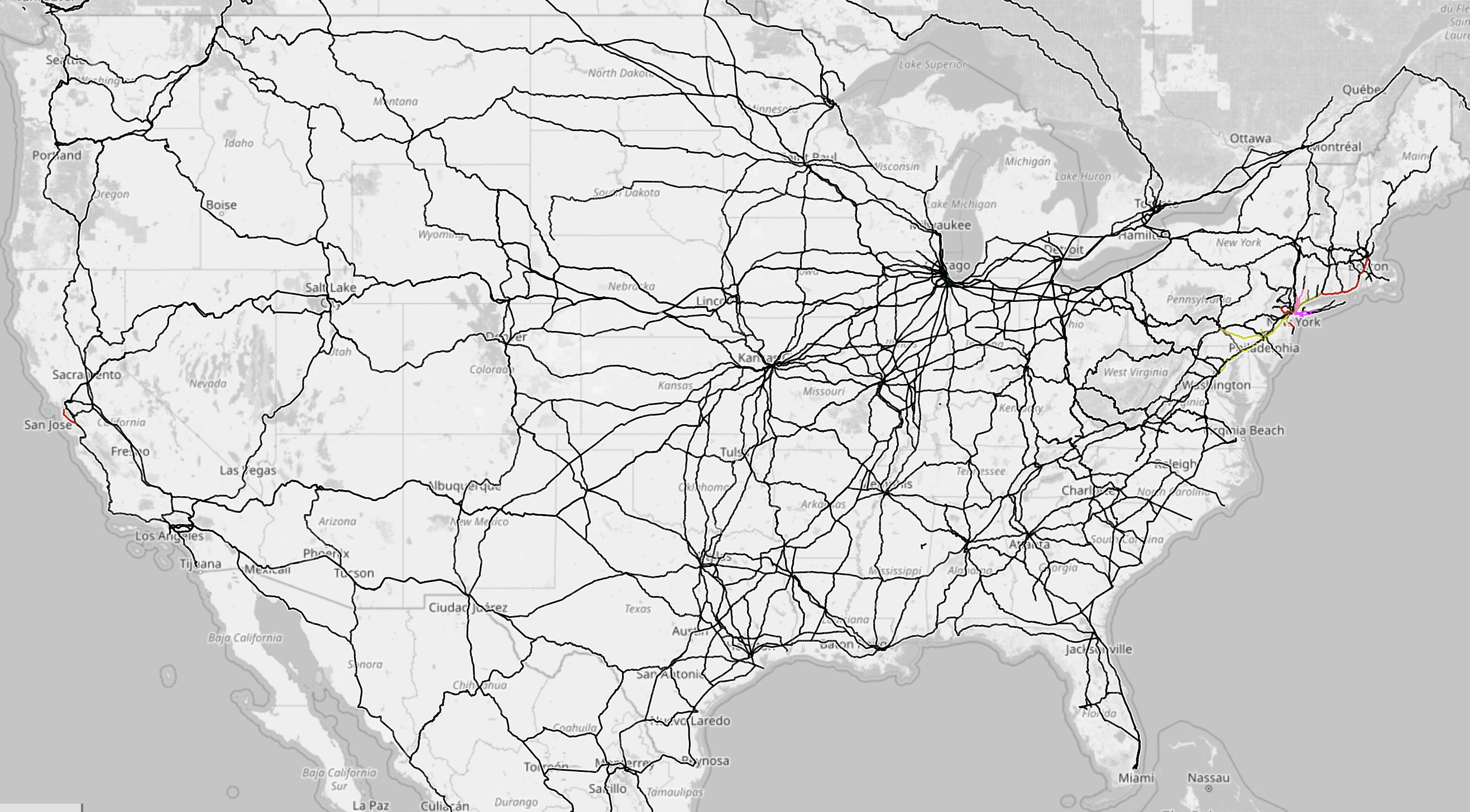"India is on the cusp of electrifying 100 percent of its rail lines, while China is nearing three-quarters of its network. Over 57 percent of the rail system in the European Union is electric. The US, which has historically prioritized personal cars over high-volume passenger trains, now can boast that it has two electric trains — and more on the way. "

They must not be counting light rail which is electric.
https://en.m.wikipedia.org/wiki/Light_rail_in_the_United_States
"The United States, with its 27 systems (as counted by the Light Rail Transit Association), has a much larger number of “true” light rail systems (not including streetcar systems), by far, compared to any other country in the world (the next largest are Germany with 10 and Japan with 9).[1]
According to the American Public Transportation Association, of the roughly 30 cities with light rail systems in the United States, the light rail systems in six of them (Boston, Los Angeles, Philadelphia, Portland (Oregon), San Diego, and San Francisco) achieve more than 30 million unlinked passenger transits per year.[2]"
The problem with light rail here is excessive heat makes the overhead wire expand and when that happens, it sags causing the trains to have to slow down. :(
In the winter, the problem is snow and ice blocking the lines and the switches.
In Portland, the biggest problem light rail has are assholes parking on the tracks.
Sounds like the trains need a cow catcher to help clear the tracks.
Or driving in front of the train!
Just hit the damn car. You’re a god damned TRAIN!!! CHOO CHOO MOTHERFUCKER!!!
It’s like Paul Heyman told Taz. “If anybody gets in your way, get em’ outta your way!”
Haha cowcatcher goes brrrrrrrrrrrr
Sounds like that should be assholes without cars
You’d think with current battery tech we wouldn’t need the overhead wire anymore.
Batteries are heavy and expensive. A wired power source is so much more efficient for rail it’s barely worth discussing.
And have a much shorter lifespan than catenary wire or third rail.
The best use of a battery on a train is a small one to handle junctions. You disconnect from the wire at the end of one set, go through the junction, and then reconnect at the other side. Saves a lot of ugly spaghetti wiring.
Otherwise, no, just use wires.
You don’t even need that. Every electric train I know of has pickups on each car, and any break in the catenary or third rail is short enough that it can be bridged naturally by two cars, or sometimes even just one, if it has pickups at both ends.
Some electric trolleys aren’t long enough to do that.
That would mean that instead of an engine, you’re lugging around a battery pack, which is just as heavy while giving you a fraction of the range of an engine. Not to forget that battery cells have only a finite lifespan.
Meanwhile, OHLE gives you infinite range and room for major weight savings. Plus you can keep running the same power system for decades.
Battery and hydrogen-powered trains exist, they’re mainly used on less frequented lines because it would be more expensive to electrify them.
Canada isn’t even on the podium :P
Maybe we should reanimate John MacDonald. Not to be a politician or give him any legitimate power (for obvious reasons), just give him a bat and make him a CN lobbyist.
Surely we’d get our rail soon.
deleted by creator
No. We’re not even on board with trains as a concept outside of the context of heavy freight shipping. The people are. But big oil spends a lot of bribe money to make sure you can’t easily ride a train across the country.
I wouldn’t doubt Big Airline spends as well.
Big freight train spends a lot on bribing too, to avoid needing to spend even more from being required to improve their services.
I fucking wish. We’re 50 damn years from common sense.
You optimist!
I wish. The US is endlessly far behind on public transportation.
Talking to my own family members around the US, they only have eyes for their enormous gas guzzler pickup trucks that they use to run to the grocery store down the street.
We don’t need public transportation, we have something better, personal transportation… We also have a robust network for air travel that will take you anywhere in the country in a few hours.
You can have both. Europe has a great mix. So awesome to have the option to take the train or bus. They also have awesome road infrastructure in most places. Try comparing an American freeway to a German freeway. You feel like you’re in a third world country when you come back to the roads in the States.
On the one hand, I hear the arguments that Europe has a higher population density, more hubs and smaller cities that make trains effective, but the same efficiencies and cost cuts can’t be achieved in the US.
On the other hand, I played railroad tycoon and saw how trains and trams were extremely successful to quickly connect and develop a sparse US through efficient public intercity and in-city transport and feel disappointed with the lack of imagination 🥲
Europe as a whole is not a lot smaller than the US, so I think many of the same efficiencies can be achieved. China has also been able to do it very efficiently and is basically the same size as the US. Granted, they have a much larger population and more potential customers, but it can definitely be done.
As I said, lack of imagination. There is this bump in effort that has to be transposed to reach actual returns on investment because energy is too cheap and secure atm. But once that bump is transposed, there is a large landscape of gains, but they can’t see past the bump.
more hubs
USA has zero hubs because the transportation system is not developed even by the standards of the 1800s.
smaller cities
Yes, smaller cities can survive with decent transit. Sadly that’s not going to happen in USA. It’s a sad concrete wasteland.
Careful, Godwin’s Law might hear you 😂
Lol
Personal transportation is extremely inefficient. You need to pay a bunch of money for something, in order to get around, and it is always space inefficient, bad for the environment and encouraged parking lot creation over housing.
It literally takes me exactly where I am going using the shortest possible route, no detours, stops or transfers, in the shortest possible time (excluding jetpacks or helicopters), that is peak efficiency of a mode of transportation.
This only works if you live in areas with no traffic. I have had multiple commutes in different cities, and would take a train whenever possible because of how unpleasant the drive is during rush hour (not to mention driving took longer, in one case 2.5x as long!). I don’t even live in a city, I’m just forced to commute because that’s where the work is. I love cars and have been an enthusiast all my life, but there are many reasons why public transportation is so popular around the world. The US might be somewhat unique in the challenges it faces with public transit, but it is still a better, cleaner, cheaper, and more efficient solution for most of the miles Americans are driving in cities or other congested areas.
You’re missing price. Compare your trip to Public transit costs, and include infrastructure costs. You had to pay for your vehicle, your car insurance (which in the US there are irresponsibly low legal minimums), registration, gas, and also taxes for the infrastructure, to get yourself somewhere which takes up more room than needed (usually several times more room than a combination lf walking and public transit). Public transit only requires fare pricing, along with infrastructure, which is significantly cheaper per person due to more efficient use of space.
Compare many European metro cities to the US, and you’ll notice their public transit is more convenient (in the characteristics you have pointed out) because we decided to shut ourselves in the foot as a country and forced everyone to have to get a car payment, while making public transit bad.
Of course, public transit isn’t convenient for every area, such as rural towns in which personal vehicles are a better solution, but we have many cities where there should be significantly better public transit.
shortest possible route
No. That would be a straight line like a train.
no detours, stops
Lmao. Whatever. Don’t stop, genius.
the shortest possible time
That would be high speed rail.
And even better! All this got rid of those pesky winters
And even better! All this got rid of those pesky winters
And replaced it with an extended hurricane season.
People driving around in personal tanks is not “something better”.
It’s dumb, privileged, unsustainable, unhealthy, violent, and literally destroying the planet.
I can’t wait for the US to finally have decent public transport, I hate having to drive for everything
I live in a big city with public transport. It’s great.
I’m always conflicted because I happen to have an LA Metro train close to me, but riding it is always scary because there are violent people, tweakers, creeps everywhere.
When I was in Mexico City recently the trains there weren’t as pretty and they were packed with people, but I didn’t see people tweaking out left and right (or at all). I actually very much enjoyed using their transit system.
Yeah, LA transit sucks, but it can be better. I wish I lived close to a line in my area (SLC), because every time I end up riding it, I enjoy it.
What are you going to do?
Well if we get good transport, I’m going to ride it duh
Are you immortal?
Yes
Now that the US doesn’t rely on auto manufacturing as its main industry, people are coming around on trains.
But, what’s that rule about headlines ending in a question mark? 🤔
No. The answer is always No.
The propaganda does not land, wake me up when we have a semblance of decent rail.
I hope your name is Rumplestiltskin, because it gonna be awhile.
Today on Nightline, is Janice from makeup going to respond favorably to my persistent battery of raunchy pickup lines?
We actually have more light rail systems than any other country in the world. Those are all electric, but yeah heavy rail is all diesel still.
If an article title is posed as a question, the answer is always no.
This was not hard to find:
I don’t understand this article. It talks as if these trains in California are the US’ first electric trains.
Our light rail here in Portland OR is electric.
And it’s better implemented than LA’s. Our system has stations in the middle of barren areas in many places. NIMBYism is a cancer in California.
There’s only one solution for the US. The world’s fastest bullet train network. Anything less will not do.
The new red line between San Francisco and San Jose is the newly built electric rail line.
The coloured lines are electrified railway. It really does stick out, its good progress.
















